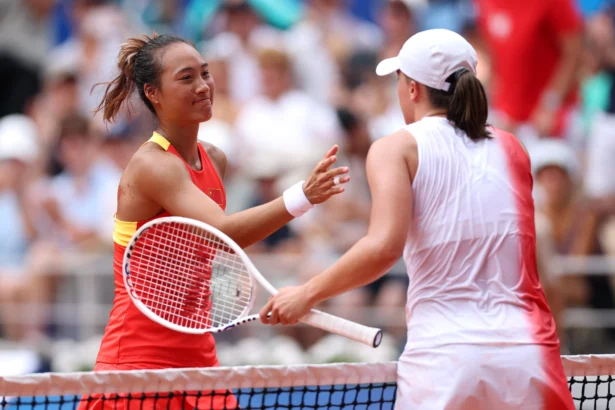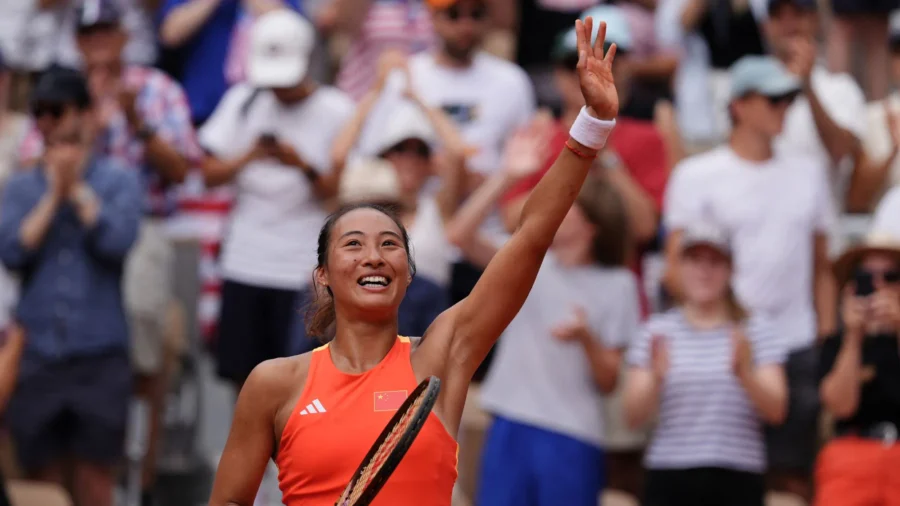PARIS—Iga Swiatek lost to Zheng Qinwen of China 6–2, 7–5 in the Paris Olympics semifinals Thursday, a surprising setback for the No. 1-ranked woman and champion at the French Open four of the past five years.
The result was hard to predict for several reasons. Swiatek entered the day with a 6–0 edge in their head-to-head matchups. She has led the WTA rankings for nearly every week since April 2022, while Zheng is No. 7. Plus, just when Swiatek appeared to be getting back into the match with a 4–0 lead in the second set, she faltered.
The really stunning part? Swiatek is as good as it gets on red clay and at this particular place. The 23-year-old from Poland has been dominant at Roland Garros, the facility used for the annual French Open and the site for tennis during these Summer Games.
Afterward, Swiatek didn’t take any questions from print reporters in the mixed zone area for interviews. Her face flushed and eyes red, Swiatek did not break stride as she passed journalists, saying only: “Sorry. Next time.”
The 21-year-old Zheng, the runner-up to Aryna Sabalenka at the Australian Open in January, assured China of its first singles medal in Olympic tennis since the sport returned to the Games in 1988.
In Saturday’s gold-medal match, Zheng will face 13th-seeded Donna Vekic of Croatia or unseeded Anna Karolina Schmiedlova of Slovakia, who were scheduled to face each other Thursday night at Court Philippe Chatrier.
Vekic eliminated No. 2 Coco Gauff, the 20-year-old American who is the reigning U.S. Open champion, in the third round.
The matchups in the men’s quarterfinals Thursday were Novak Djokovic of Serbia vs. Stefanos Tsitsipas of Greece, and Tokyo Games champion Alexander Zverev of Germany vs. Lorenzo Musetti of Italy in the top half of the bracket; Carlos Alcaraz of Spain vs. Tommy Paul of the U.S., and Casper Ruud of Norway vs. Felix Auger-Aliassime of Canada in the bottom half.
Swiatek’s dominance against Zheng included a victory in the same stadium during the fourth round of the 2022 French Open. Zheng also took the first set of that one, the only set dropped by Swiatek during that event.

Things have not quite gone so smoothly this week.
In the quarterfinals Wednesday, Swiatek was forced to three sets and got the wind knocked out of her when she was hit by a ball off the racket of opponent Danielle Collins, who wound up retiring from the match because of an injured stomach muscle. Afterward, Collins, an American, gave Swiatek a lecture about being “insincere” when they spoke on court.
Surprisingly, perhaps, it was Zheng who made the first dent, taking advantage of three unforced errors by Swiatek, including a game-ending double-fault, to break for a 2–1 lead. That lead, such as it was, lasted all of five minutes, because Swiatek—backed by clap-accompanied shouts of “Iga! Iga!”—broke right back to 2-all.
But then Zheng, her big serve and big groundstrokes clicking, began to take full advantage of Swiatek’s many misses and reeled off four games in a row.
After that set, Swiatek draped a white towel over her shoulders, grabbed her equipment bag and headed to the locker room to take a break, which is allowed in tennis. Maybe the pause allowed her to recalibrate. Maybe it caused Zheng to lose her focus. Whatever the case, the match’s entire complexion shifted immediately.
When play resumed, it was Swiatek who was back to being her best self, hitting heavy, confident forehands, dictating points. A double-fault by Zheng gave Swiatek a 4–0 edge in the second set. Yet Zheng didn’t concede a thing and, suddenly, it was 4–4.
When it ended, thanks to a shot Zheng put right near a line but Swiatek thought landed out, the winner dropped to her back, covering it with clay.
By Howard Fendrich

